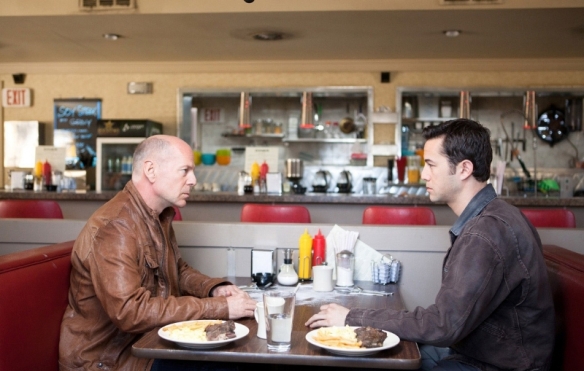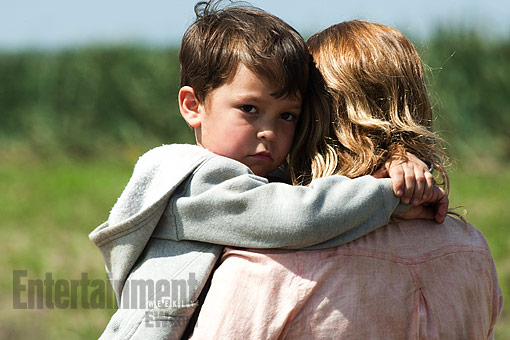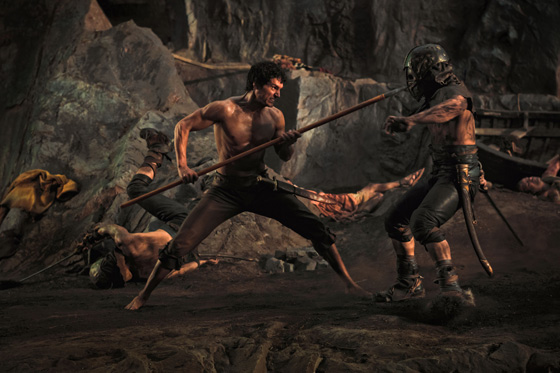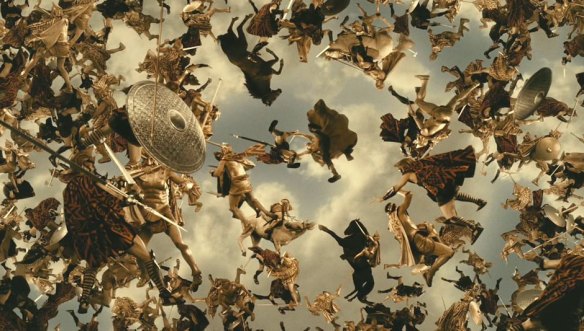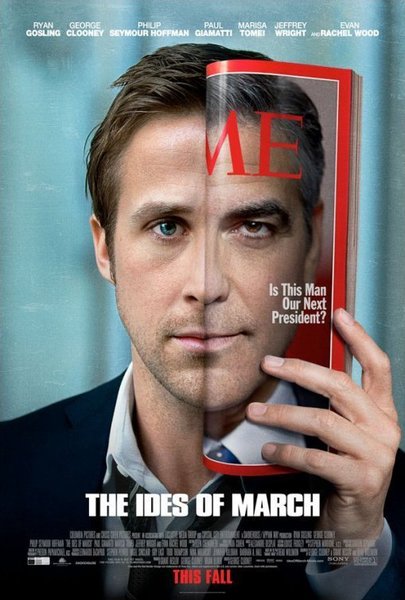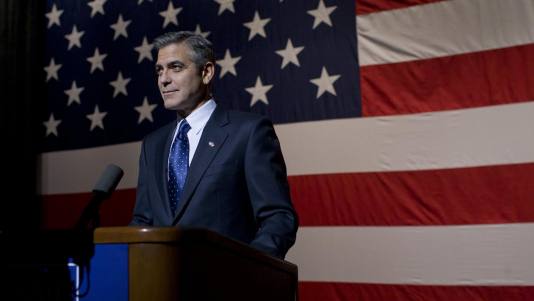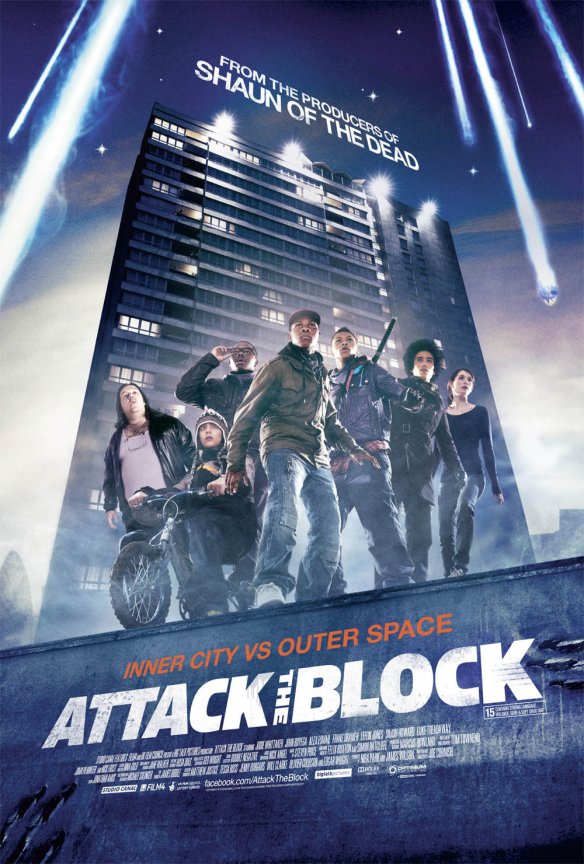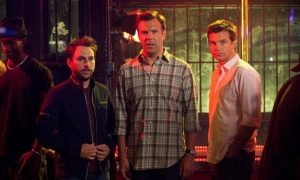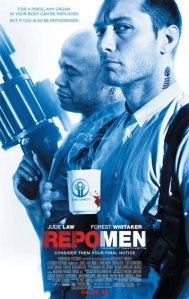I loved this movie. I saw it very late at night and was tired at work the next day, but it was totally worth it. It was every bit as interesting as I’d hoped it would be, but it was also surprising. There were so many “wait, what? OH!” moments, and it turned out to be much less “about” the time travel than it was about the complex, compelling characters.
There are potentially a few reasons why some of you may prefer to wait to watch this on DVD; there is a scene with a topless prostitute, and two of the trailers beforehand were for graphic horror movies, (at least at my theater. I know that’s different at different locations, but the trailers are always trying to target a segment of the audience they’re predicting will see the feature presentation). You could fast-forward through the topless scene without missing anything crucial, and come back and read below my spoiler warning to find what the dialogue in that scene added to the story.
**SPOILER ALERT** Everything below this picture is a spoiler. I think the movie is much more enjoyable on first viewing if you don’t know anything about what’s going to happen, so read on at your own risk.
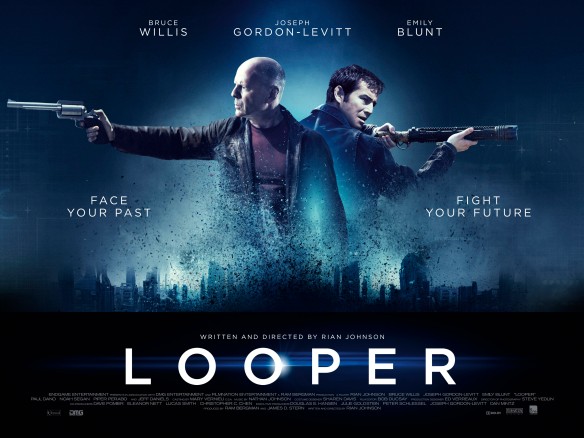 The story is set 30 years in the future, (in Kansas, supposedly), and we’re told that 30 years from that point, time travel will have been invented. It’s illegal, but the mob in the future uses it to send people they want eliminated back in time, where hired guns like Joe (Joseph Gordon-Levitt) shoot them and dispose of the body. Joe is what’s known as a “looper,” and the job ends when one day the anonymous target turns out to be the looper’s 30-year-future self, thus “closing the loop.” The retired looper then has 30 years to spend their money and enjoy life before the inevitable date that they know they will be sent back and killed by their younger self.
The story is set 30 years in the future, (in Kansas, supposedly), and we’re told that 30 years from that point, time travel will have been invented. It’s illegal, but the mob in the future uses it to send people they want eliminated back in time, where hired guns like Joe (Joseph Gordon-Levitt) shoot them and dispose of the body. Joe is what’s known as a “looper,” and the job ends when one day the anonymous target turns out to be the looper’s 30-year-future self, thus “closing the loop.” The retired looper then has 30 years to spend their money and enjoy life before the inevitable date that they know they will be sent back and killed by their younger self.
We see what happens when a looper fails to kill his future-self, because Joe’s friend Seth does just that. The scene with Old Seth losing his extremities (they just disappear, and we know that off-camera, Young Seth is being mutilated by the mob, since they can’t have a future-man running around and potentially changing the timeline) is one of the most horrifying yet bloodless things I’ve ever seen; it’s very creative storytelling. (And it’s probably the reason for those horror trailers at the beginning.) When Joe is confronted with the prospect of closing his own loop, he too fails to shoot his future-self, so Young Joe spends much of the movie trying to track down and kill Old Joe to right himself with his mob contract, while Old Joe (Bruce Willis) has his own agenda of tracking down and killing a child who will grow up to be the future-mob leader responsible for killing Old Joe’s wife. (It’s a little confusing, as time travel always is, but it’s a perfectly thrilling story if you don’t let yourself get hung up on figuring out exactly how it works).
Old Joe and Young Joe are entirely different people; they have different motives, attachments, and skills. It’s fascinating to think about how much a person can change in their life. Joe didn’t intentionally try to change himself, it just happened as he accumulated experiences and relationships. Old Joe is motivated almost entirely by love for his wife and a desire to save her, which makes him willing to carry out despicable acts that Young Joe would never consider. Scripture tells us that we should become a different, “new” person when we give our lives to Christ. As Old Joe’s life and all his decisions are dominated by a love for his wife, Christians’ lives should be dominated by a love for God that changes our attitudes and goals from what we may have wanted before. (I’m NOT saying Old Joe is a good example of becoming a new creation! Just that the way he’s transformed is a perverse partial parallel to conversion.)
Therefore, if anyone is in Christ, the new creation has come: The old has gone, the new is here!
Do not conform to the pattern of this world, but be transformed by the renewing of your mind. Then you will be able to test and approve what God’s will is—his good, pleasing and perfect will.
Joe grows up without a mother, and the loss of that nurturing, loving guidance in his life is profoundly felt. In the aforementioned scene with the topless prostitute, Young Joe is upset because he betrayed his best friend to the mob. He laments that he can’t remember his mother’s face, and misses the way she used to brush her fingers through his hair. I think he’s wishing both that she could comfort him again, and that he could have asked her what he should have done. Later, he talks to Cid about the fact that his mother abandoned him when he was younger than Cid, and says joining the mob as a looper gave him purpose, that his assassin’s gun was “something that was mine.” The parallel to Cid is clear; if he grows up without his mother, too, we understand that he will follow the same bad path as Joe, but with magnified violence and destruction due to his telekinetic abilities. All of this illustrates the importance of parents providing not only love and care, but also instilling a good moral compass into their children.
Start children off on the way they should go,
and even when they are old they will not turn from it.
Cid’s mother, Sara, (Emily Blunt), left her infant son to be raised by her sister, and admits her guilt over abandoning him as a baby to Young Joe. It’s clear she regrets not having been there to take care of him, and that she truly loves him and is willing to be unconditionally dedicated to protecting and nurturing her son. She tells Young Joe that she cares more about Cid’s well-being than the painful, daily reminders that he doesn’t acknowledge her as his mother:
Whether he loves me back or not, as long as I’m there to raise him, he’s gonna be okay, he’s gonna be safe. He’s never gonna get lost.
Sara’s relationship with Cid reminds me of Isaiah 49:15; even though she acts like she doesn’t care about him at first, she still obviously cares about him more than her own life and is willing take a bullet for him. God says his love for his people surpasses even the deep love of a mother for her child:
Can a mother forget the baby at her breast and have no compassion on the child she has borne? Though she may forget, I will not forget you!
In the end, Young Joe sacrifices himself to protect and potentially save Cid, not only from the immediate trauma of losing his mom, but from the damning future ahead of him if he grows up “bad.” He’s also saving Sara’s life. His self-sacrifice fulfill Jesus’ words in 1 John :15:12-13:
“This is my commandment, that you love one another as I have loved you. Greater love has no one than this, that someone lay down this life for his friends.”
Young Joe’s decision to “change the loop” also reminds me of what he told Cid earlier, when talking about the anger he once felt towards the men who got his mother addicted to drugs.
“It’s just men trying to figure out what they gotta do to keep what they got. That’s the only kind of man there is.”
What Young Joe has, that he knows he will lose if he grows up into the version of Old Joe standing in front of him in that field, is a compassion and morality that will not let him kill a child. Young Joe has killed many unknown victims in his job as a Looper, but still cannot stomach killing a child, even when he has seen the violent destruction the child is capable of and “knows” he will grow up to be ruthless killer. But Old Joe has already killed a child, and is intent on killing another. Old Joe was targeting three children, even though he knew two were innocent, all to save his wife and despite being horrified himself at what he was doing. By killing himself, Young Joe not only saves Cid and Sara, but he also “keeps” what he’s got; a clean(er) conscience, and hands that haven’t yet spilled an innocent child’s blood. In a way, he’s saving himself, too–from every becoming that dark.
Overall, I loved this movie because it was so creative and exciting to watch, even the second time through. There are all sorts of little clues and hints you pick up on repeat viewing, and the acting is fantastic. After I watched it I realized that the promotional trailers and the first half of the movie foretold how it would end, because Young Joe kept saying he was going to kill Old Joe, and in the end he did, he killed himself just like he said he would! But I didn’t see it coming until it almost happened! It’s great storytelling, and I do think the message of self-sacrifice is one of the most powerful themes out there. I mean, Jesus himself said there’s “no greater love.”

